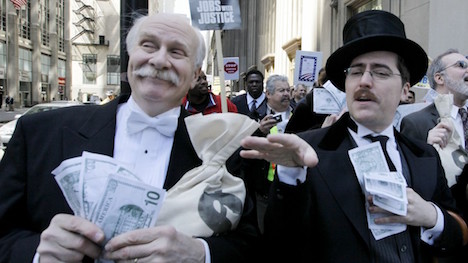Iceland Sentences 29th Banker To Prison, US Bankers Still Collecting Bonuses
 Print This Print This
By Mint Press News Desk
Mint Press News
Tuesday, Feb 2, 2016
Iceland’s economy was among those hit hardest by the 2008 financial crash, leading to unusually strict treatment of the bankers responsible
 |
| Protesters dressed as wall street bankers, march from Goldman Sachs’ office to a rally demanding Wall Street reform. Iceland has prosecuted 29 bankers for financial crimes crashed their economy, the U.S. has prosecuted none. (AP Photo/M. Spencer Green) |
While the world economy struggles to recover from the 2008 financial crisis, most of the bankers who caused the collapse are still collecting massive salaries and have faced few, if any, consequences.
Except in Iceland.
In one of the countries hit hardest by the collapse, 29 bankers have now been sentenced to prison for their roles in the crash. According to, Stefan Simanowitz, writing for The Huffington Post on Jan. 5, “Just before Christmas, the former CEO of Iceland’s Glitnir bank and two other senior bankers were sentenced to jail terms of up to five years for market manipulation and breach of fiduciary duties.”
Simanowitz questioned why the United States and the United Kingdom, for example, have been far more lenient on their banks.
“[N]ot a single senior banking executive in the US or the UK has been jailed for their role in the financial crisis. Whilst banks — such as the five found to be rigging the Libor rate — have been hit with substantial fines, the individual bankers behind the fraud, market rigging and irresponsible lending that led to the economic meltdown have all avoided time behind bars.”
In October, Alan Pyke, the deputy economic policy editor for ThinkProgress, outlined some of the ways Iceland’s approach differed from that of other countries:
“Like other countries with a large financial industry presence, Iceland spent a lot of money on bailouts after the crisis. But it bailed out workaday citizens instead of bankers, forgiving mortgage debts that exceeded 110 percent of the actual value of the home linked to the loan. The banks, which had swarmed to the north Atlantic island after aggressive deregulation of Icelandic finance law around the turn of the century, were allowed to fail and go bankrupt.”
Pyke cautioned that “[c]omparing Iceland and the U.S. isn’t entirely fair,” given the difference in population and the relative size of our economies. “It’s far easier for a country of 320,000 people to nationalize its banks, devalue its currency, and bounce back rapidly after a couple years of deep economic pain,” he wrote.
Meanwhile, there’s reason to be concerned that other countries haven’t done enough to prevent another crash. The most recent bank to pay a major fine in the U.S. was Goldman Sachs, which agreed to a fine of $5.1 billion. The massive international investment bank claimed to be “pleased” with the deal, which will “reduce earnings for the fourth quarter of 2015 by approximately $1.5 billion on an after-tax basis.” But for the corporation that brought in over $40 billion in 2014, the fine isn’t likely to cut too deep into profits.
Reporting on the agreement on Jan. 15, Shadowproof’s Dan Wright noted that banks continue to earn money while the rest of the population suffers.
“In the aftermath of the crisis Wall Street caused, the middle class has been hollowed out, with the US hitting a record amount of childhood poverty. The perpetrators, meanwhile, have been fully restored and are beating profit expectations. What a country.”
Other banks forced to pay fines — without executives going to court — include Citigroup Inc., JPMorgan Chase & Co. and Bank of America Corp.
Wright also reported on Jan. 11 that many of the key factors that caused the 2008 financial crash are still in place, creating the potential for a new bubble economy, as depicted in the recent, popular film and book, “The Big Short.”
“[P]rior to the 2008 crash the credit rating agencies were giving junk mortgage-backed securities (MBS) their highest ratings. This incorrect information helped distort the market and exacerbated the crisis. The rating agencies gave the bad ratings their approval, in part, because of a conflict of interest where rating agencies are paid by those they rated. If a client did not get the rating they wanted, they would take their business elsewhere.
Now the SEC is saying the rating agencies are back to their old tricks, compromising their claimed objectivity to bring in business.”
False confidence in these high-rated securities that were actually full of junk mortgages was a major factor which contributed in the original crash. He concluded, “Apparently, we are going to run this experiment again and hope for different results.”
Source URL
|
 Print This Print This

|

